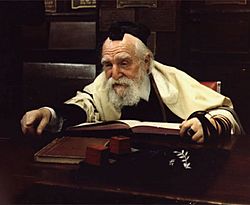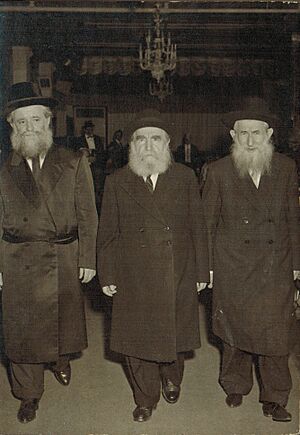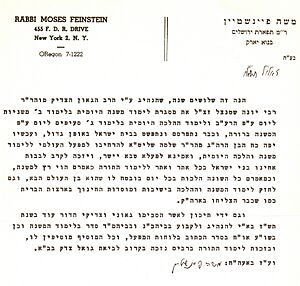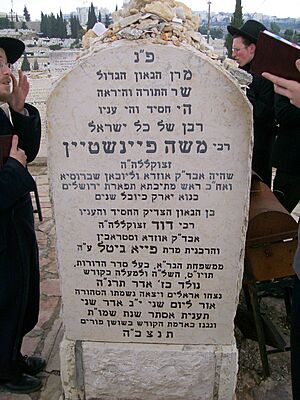Moshe Feinstein facts for kids
Quick facts for kids
Rabbi
Moshe Feinstein
|
|
|---|---|

Moshe Feinstein at his desk in the bais medrash of Mesivtha Tifereth Jerusalem.
|
|
| Born | March 3, 1895 |
| Died | March 23, 1986 (aged 91) New York City, United States
|
| Resting place | Har HaMenuchot, West Jerusalem |
| Other names | Rav Moshe, Reb Moshe |
| Occupation | Rabbi, Posek |
| Employer | Mesivtha Tifereth Jerusalem |
| Known for | Igros Moshe, various rulings in Jewish law |
| Spouse(s) | Shima Kustanovitch |
| Children | Pesach Chaim Feinstein Dovid Feinstein Reuven Feinstein Shifra Tendler Faye Shisgal |
Moshe Feinstein (March 3, 1895 – March 23, 1986) was a very important Orthodox Jewish rabbi and scholar. He was born in Russia and later moved to America. People often called him "Reb Moshe" or "Rav Moshe".
He was known as a posek, which means he was an expert in halakha (Jewish law). He gave rulings on many difficult questions about Jewish life. Many people consider him the most famous Jewish legal authority of the 20th century. His decisions are still used by rabbis today. He also led important Jewish organizations in America.
Contents
Life Story of Rabbi Moshe Feinstein
Rabbi Moshe Feinstein was born in a town called Uzda, near Minsk, which is now in Belarus. This was on March 3, 1895. His father, Rabbi David Feinstein, was also a rabbi. Moshe studied with his father and in special Jewish schools called yeshivas. He learned a lot from his teachers and his uncle.
Moving to America
Moshe Feinstein became a rabbi in a town called Lyuban, where he worked for 16 years. He married Shima Kustanovich in 1920. They had four children in Europe. Because of problems with the government in the Soviet Union, he moved his family to New York City in January 1937. He lived there for the rest of his life. Another son was born in the United States.
In New York, he became the head of a yeshiva called Mesivtha Tifereth Jerusalem. A rosh yeshiva is like the dean of a Jewish learning academy. He later opened another branch of the yeshiva in Staten Island. His sons, Dovid Feinstein and Reuven Feinstein, later became leaders of these schools.
Rabbi Feinstein was also the president of the Union of Orthodox Rabbis. He led the Moetzes Gedolei HaTorah, which is a council of important rabbis in America. He also helped lead an organization in Israel called Chinuch Atzmai, which supports religious schools.
His Role as a Jewish Law Expert
Rabbi Feinstein was seen by many as the top expert in halakha (Jewish law) of his time. People from all over the world would ask him for advice on very complex Jewish law questions. He helped solve many business and work disagreements using Jewish law. For example, he wrote about rules for strikes and fair competition.
Jewish Law and Modern Life
He was also an expert in Jewish medical ethics. This means he applied Jewish law to new medical situations. He would often talk to scientists and doctors, including his son-in-law, who was a biology professor. For example, he discussed early heart transplants.
Rabbi Feinstein also gave opinions that helped guide the Orthodox Jewish community. He sometimes had different views from other rabbis on certain topics. For instance, while he advised against smoking, he did not forbid it outright, though he did prohibit second-hand smoke. Even when other rabbis disagreed with him, they still respected him as a major authority in Jewish law. His many decisions were collected in a famous set of books called Igrot Moshe.
His Passing
Rabbi Moshe Feinstein passed away on March 23, 1986. More than 20,000 people came to his funeral in New York. His body was then flown to Israel for burial. His funeral in Israel was attended by a huge crowd, estimated to be between 200,000 and 250,000 people. He was buried in Har HaMenuchot, a cemetery in Jerusalem.
Notable Students
Many students learned from Rabbi Feinstein. Some of his well-known students include:
- Nisson Alpert, a rabbi in New York
- Avrohom Blumenkrantz, who wrote a book about Jewish holidays
- Shimon Eider, a Jewish law expert and author
- Dovid Feinstein, his son and head of a yeshiva in New York City
- Reuven Feinstein, his son and head of a yeshiva in Staten Island
- Shmuel Fuerst, a Jewish judge in Chicago
- Ephraim Greenblatt, a Jewish law expert
- Nota Greenblatt, a chief judge in Memphis, Tennessee
- Moshe Dovid Tendler, his son-in-law and a yeshiva dean
- Jackie Mason, a rabbi who also became a famous comedian
His Writings
Rabbi Feinstein wrote about 2,000 responsa. These are answers to questions about Jewish practice in modern times. Many of these answers are found in his famous books.
Main Works
- Igrot Moshe: This is a collection of his Jewish law decisions. It has seven volumes published during his lifetime, and two more were published after he passed away. Rabbis today often refer to these books.
- Dibrot Moshe: This is a 14-volume work that explains parts of the Talmud, which is a central text of Jewish law.
- Darash Moshe: This book was published after his death. It contains explanations on the weekly Torah reading.
- Kol Ram: This work has three volumes.
Some of his early writings were lost in Russia. Rabbi Feinstein was known for sometimes explaining that certain ideas found in old texts were not written by the original great scholars, but perhaps added by their students. He did this to respectfully explain why he might disagree with a certain point.




